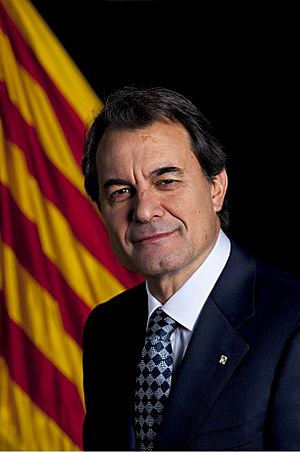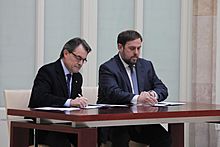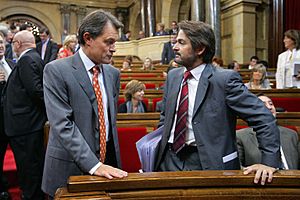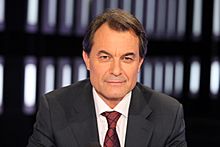Artur Mas facts for kids
Quick facts for kids
Artur Mas
|
|
|---|---|

Official portrait, 2011
|
|
| 129th President of the Government of Catalonia | |
| In office 24 December 2010 – 11 January 2016 |
|
| Monarch | Juan Carlos I Felipe VI |
| Vice President | Joana Ortega Neus Munté |
| Preceded by | José Montilla |
| Succeeded by | Carles Puigdemont |
| First Minister of Catalonia | |
| In office 19 January 2001 – 20 December 2003 |
|
| President | Jordi Pujol |
| Preceded by | Josep Tarradellas (1937) |
| Succeeded by | Josep-Lluís Carod-Rovira |
| Government Spokesperson of Catalonia | |
| In office 2000 – 5 November 2002 |
|
| President | Jordi Pujol |
| Succeeded by | Felip Puig |
| Leader of the Opposition in the Parliament of Catalonia | |
| In office 27 May 2004 – 23 December 2010 |
|
| Preceded by | Pasqual Maragall (2003) |
| Succeeded by | Joaquim Nadal |
| Minister of Economy and Finance of Catalonia | |
| In office 30 July 1997 – 17 January 2001 |
|
| President | Jordi Pujol |
| Preceded by | Macià Alavedra |
| Succeeded by | Francesc Homs Ferret |
| Minister of Town and Country Town and Public Works of Catalonia | |
| In office 15 June 1995 – 30 July 1997 |
|
| President | Jordi Pujol |
| Preceded by | Jaume Roma |
| Succeeded by | Pere Macias |
| Personal details | |
| Born |
Artur Mas i Gavarró
31 January 1956 Barcelona, Catalonia, Spain |
| Citizenship | Spanish |
| Political party | Independent (since 2023) |
| Other political affiliations |
Catalan European Democratic Party (2016–2023) Democratic Convergence of Catalonia (1991–2016) |
| Spouse | Helena Rakosnik |
| Children | 3 |
| Alma mater | University of Barcelona (BSS) |
| Signature |  |
Artur Mas i Gavarró (born January 31, 1956) is a politician from Catalonia, Spain. He served as the leader of the Catalan government, known as the President of Catalonia, from 2010 to 2016.
Mas was a long-time member of the Democratic Convergence of Catalonia (CDC) party. This party was part of a larger group called Convergència i Unió (CiU). CiU was a major political force in Catalonia for many years. In 2001, Mas became the general secretary of CDC. Later, in 2012, he became the president of the party. In 2016, CDC changed its name to the Catalan European Democratic Party (PDeCAT), and Mas led this new party until 2018.
From 2003 to 2015, Artur Mas ran five times to become the President of Catalonia. He won the presidency in 2010 and 2012. However, his party did not win a clear majority of votes. This meant he needed support from other parties to govern. His time as president was sometimes difficult, leading him to call for new elections early.
Artur Mas studied economics at the University of Barcelona. He speaks several languages, including English, French, Catalan, and Spanish. His political ideas are often seen as supporting a free economy and more independence for Catalonia. He has also supported moderate social ideas, like some gay rights.
In 2010, Mas said he would vote "Yes" if there was a public vote on Catalonia becoming separate from Spain. Since then, the idea of Catalonia becoming independent has been a big part of his political work. He helped his party, CDC, move towards supporting this idea.
Contents
Early Life and Education
Artur Mas was born in Barcelona, a major city in Catalonia. He was one of four children in a family that owned businesses. His mother was from Sabadell, and his father was from Poblenou.
He went to the Aula escola europea school. This helped him become fluent in French, English, Catalan, and Spanish. After school, he studied Economics at the University of Barcelona. He later married Helena Rakòsnik.
Political Career
Before becoming a major political figure in Catalonia, Artur Mas worked in both private companies and public service. He focused on helping Catalan businesses grow internationally. From 1987 to 1995, he was a member of the Barcelona City Council. He represented the Democratic Convergence of Catalonia party.
His first big roles in the Catalan government came when Jordi Pujol was President of Catalonia (from 1980 to 2003). Artur Mas served in several important positions:
- Minister of Public Works (1995–1997)
- Minister of Economy and Finance (1997–2001)
- Deputy Prime Minister (2001–2003)
- Government's official spokesperson (2000–2003)
Running for President
Artur Mas first ran for President of Catalonia in the 2003 elections. His party, CiU, won the most seats in the parliament. However, another party, the Socialists' Party of Catalonia (PSC), received slightly more votes overall. Because of how the election rules worked, the PSC leader, Pasqual Maragall, became President. He formed a government with two other left-wing parties.
Mas ran again in the 2006 elections. This time, his party CiU won both the most votes and the most seats. But they still did not win enough seats to have a clear majority. So, the PSC candidate, José Montilla, became President by forming a similar government with the same left-wing parties.
Since 2007, Mas has focused on a plan called the Refoundation of Catalanism. This plan aimed to strengthen the ideas of the Catalanist movement. It sought to gain more support for the idea that Catalonia should have the "Right to decide" its own future. This included the possibility of holding a vote on independence from Spain. This idea became more popular after a Spanish court changed parts of the Catalan Statute in 2010. Many Catalans had voted for this law in 2006.
In January 2018, Artur Mas stepped down as president of the PDeCAT party. He said this did not mean he was leaving politics completely, but that he would take a less active role.
Presidency of Catalonia
First Term: 2010–2012
The Catalan elections on November 28, 2010, were very important for Artur Mas. He was running for President for the third time. During his campaign, Mas promised to create a government with the best people, even if they were not from his own party. He also wanted Catalonia to have full control over its taxes. He planned to let Catalans vote on this idea.
Surveys suggested his party would win enough seats to govern without relying too much on other parties. CiU won 62 out of 135 seats in the Catalan Parliament. This was not a full majority.
On December 23, 2010, Artur Mas became President of Catalonia. He was able to do this because the Socialists' Party of Catalonia (PSC) agreed not to vote against him. In his speech, Mas talked about a new way for Catalonia to manage its money. He also spoke about Catalonia's journey towards having the "right to decide" its future.
The agreement with the PSC did not last long. This meant Mas had to find new allies in the parliament. He then worked with the Popular Party (PP). With their support, Mas was able to pass the government's budget for 2012.
Second Term: 2012–2015 and the Independence Movement

In September 2012, less than two years into his first term, Artur Mas announced that Catalonia should have the "right of self-determination." This statement came after a very large demonstration in Catalonia, where many people supported independence. On September 25, 2012, Mas called for new elections for the Catalan Parliament to be held on November 25. He said that the strong feelings shown in the streets needed to be expressed through votes.
Mas hoped to win a clear majority in these new elections. However, his party, CiU, actually lost 12 seats. Still, the parties that supported Catalonia's independence (CiU and ERC) gained more votes overall. This meant that together, they controlled more than half of the seats in the Catalan Parliament.
After the election, Mas needed to form a stable government. He talked with Oriol Junqueras from the ERC party. ERC did not join Mas's government, but they agreed to support his government's goals. This agreement was called the "Agreement for Freedom." Artur Mas became President of Catalonia for the second time on December 21, 2012. He officially took office on December 24.
On December 12, 2013, Artur Mas and leaders from five Catalan parties announced a date for a referendum (a public vote) on Catalonia's future. It was set for Sunday, November 9, 2014. The question had two parts: "Do you want Catalonia to become a State?" and "If yes, do you want this State to be independent?" In April 2014, this proposal was presented to the Spanish Parliament, but it was rejected. Mas stated that the referendum would happen legally. However, the Spanish Constitution says that votes on independence must be held across the whole country, not just in one region. This led the Spanish government to block the referendum.
Political Views
Artur Mas believes that Catalonia has a strong connection to European history, especially to the "Franco-Germanic world." He has said that Catalans have a special link that makes them feel more connected to this history than to Roman history.
He also holds the view that Spain can only become a "complete" nation if Catalonia is no longer a part of it.
2015 Election and Stepping Down
The disagreements over the referendum led to political instability. As a result, Mas called for a second early election in a row. Due to disagreements within his party coalition about the push for independence, CDC and Unió decided not to work together anymore. This ended 37 years of cooperation between the two parties.
Instead, CDC joined forces with ERC to form a new group called Junts pel Sí (Together for Yes). This new group announced that Artur Mas would be their candidate for president. However, he was placed fourth on their list of candidates. This new group won 62 seats, but still did not get a clear majority.
The only other party willing to negotiate with Junts pel Sí was the Popular Unity Candidacy (CUP), a far-left party that also supported independence. After long talks, the CUP decided not to support Mas as president. In January 2016, after three months of difficult negotiations, Mas decided to step down from his candidacy. This allowed a new government to be formed and avoided another early election. At that time, Mas also resigned from his seat in parliament. He said he would focus on rebuilding his party, CDC.
Later, CDC was renamed the PDeCAT. Mas continued to hold a leadership role in this new party until January 9, 2018, when he resigned from that position.
Images for kids
See also
 In Spanish: Artur Mas para niños
In Spanish: Artur Mas para niños
 | Georgia Louise Harris Brown |
 | Julian Abele |
 | Norma Merrick Sklarek |
 | William Sidney Pittman |




